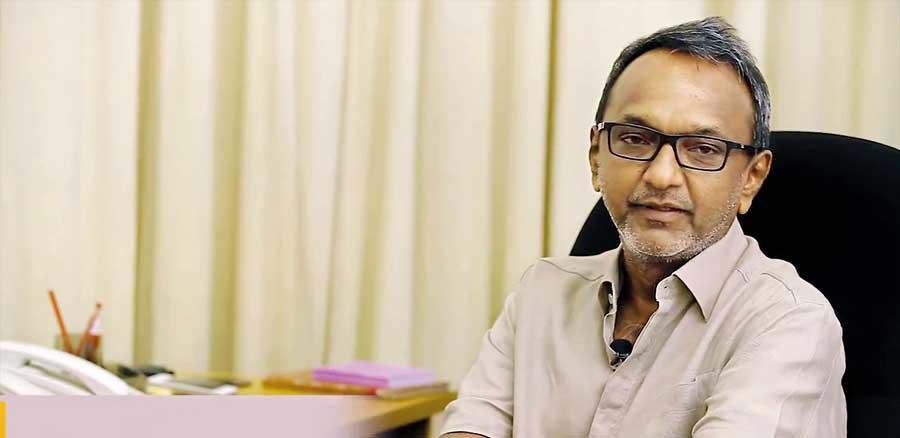09 Jul 2020 - {{hitsCtrl.values.hits}}

 Imthiaz Bakeer Markar is a prominent member of the newly-formed Samagi Jana Balawegaya (SJB), and is on its National List for the upcoming parliamentary polls. The son of former Speaker M.A. Bakeer Marker, Imthiaz has a longstanding involvement with the United National Party (UNP). He spoke to Daily Mirror on the role and goals of the SJB in the current political climate. Excerpts:
Imthiaz Bakeer Markar is a prominent member of the newly-formed Samagi Jana Balawegaya (SJB), and is on its National List for the upcoming parliamentary polls. The son of former Speaker M.A. Bakeer Marker, Imthiaz has a longstanding involvement with the United National Party (UNP). He spoke to Daily Mirror on the role and goals of the SJB in the current political climate. Excerpts:
You have mentioned the SJB is a party that is embarking on a new journey. What do you mean by this?
The SJB is the offspring and creation of the UNP which seeks to follow the UNP’s founding principles. I’m a  member of the UNP Working Committee (WC) which unanimously voted to unite all anti-government forces and build a new political movement. The WC also unanimously chose UNP deputy-leader Sajith Premadasa to lead this movement, and wanted him named as the Prime Ministerial candidate. It was also decided he would head the nominations committee and have powers to appoint the party General Secretary. These decisions were ratified at the next WC meeting.
member of the UNP Working Committee (WC) which unanimously voted to unite all anti-government forces and build a new political movement. The WC also unanimously chose UNP deputy-leader Sajith Premadasa to lead this movement, and wanted him named as the Prime Ministerial candidate. It was also decided he would head the nominations committee and have powers to appoint the party General Secretary. These decisions were ratified at the next WC meeting.
This is a new journey because historically the UNP never had a period of more than five years when the party leader was not the state leader. In 1989 Ranasinghe Premadasa was elected as the state leader. Since then there was a dark era of 31 years where the party could not produce a state leader. This frustrated and impacted the confidence of party members. They felt the party was moving along a wrong path, and began to pressurize the party hierarchy to change course and leadership.
Historically we used to elect leaders annually. But now we had a lifelong leader. At the convention announcing Sajith Premadasa as presidential candidate, Ranil Wickremesinghe accompanied former First Lady Hema Premadasa to the stage. But as Sajith’s name was proposed, a new proposal stating the party leader would be elected every six years was slipped in. Such moves harmed the party’s heritage of internal democracy.
When Ranjan Wijeratne was General Secretary he decided vacancies for party organisers would be made based on the choice of electoral organisations. I was elected as Beruwala organiser by 98 votes in a secret ballot. This was the internal democracy that allowed for natural leaders to emerge. But later this heritage changed. We had a social democratic agenda. But that too changed.
You have mentioned social democracy before, especially during Sajith Premadasa’s presidential campaign. But the UNP is associated more with free market policies than with social democratic policies. What do you mean by a social democratic agenda?
We stand for individual rights, competition, a place for talent, and equal opportunity for all without discrimination. But those who fall back must also have support. The founder UNP leaders gave us free education. When I was an undergraduate we had student loans which we had to repay after obtaining a degree and getting a job. This was abolished and the Mahapola student scholarship, text books, school uniforms and school meals were given free. Our leaders gave land and established farmer colonies. Free housing was provided through programmes like Janasawiya. Our social democratic programme was an example to other countries. It was a programme that was sensitive and responsive to poor and oppressed people. This used to be the UNP agenda, but it later moved away from that.
When did this happen?
There were many debates regarding this in the WC and other party forums. But they could not be openly discussed. We had a strong foreign policy. We entered the rice-rubber pact with China. When imperialist countries wanted to punish Japan J.R. Jayewardene went to San Fransico and quoted the nahi verena verani gatha and said the world should help that fallen country. Likewise we did not ostracize China. Whether on South Africa or Palestine, our leaders set an example to the world and did not give in to imperial powers.
But lately we saw if western countries got a cold, our leaders got pneumonia. But that’s not what the UNP should be. We had a social democratic agenda, internal democracy and a strong foreign policy. Our leaders were sensitive to people’s pain and problems. But later this changed and the people punished us.
So the party needed to start a new journey. I see this moment as one handed to us by destiny. There is an energetic youthful leadership with a vision for the future. We have a good team.
Sajith also has the confidence to openly engage in discussions and debates with the media and intelligentsia. The Rajapaksa leadership does not face questions and answers from the media or intelligentsia. The new generation wants a leadership that is familiar with global trends and is open minded. So ours is a new journey, with a new team and new and youthful leader.
Social democracy is a nice concept. But Sri Lanka has a foreign debt crisis and organisations like the IMF are demanding we reduce the budget deficit. This requires slashing welfare and increasing taxes. In this light can you realistically give people the social security they need?
Historically Sri Lanka began taking foreign loans after 1956. At the time Lee Kuan Yew wanted to model Singapore on Sri Lanka. But now our children go to Singapore seeking low-paying jobs. Those days people used to call slums ‘Korea’. But today our youth go to Korea as immigrant workers.
Lee Kuan Yew took over Singapore when Malay and Chinese people were at each others throats. But he wanted to build one country and one nation and unite the people. Singapore is now among the top ten countries in per capita income. Before he died Lee Kuan Yew said the Sri Lanka could not progress because of ethnic strife.
This began from the 1950s on wards when the Sinhala-Tamil conflict was created based on language rights. A lot of phobias were created at different times. At one time there was a Catholic phobia. There was a Tamil phobia. Now there’s Islamaphobia. Since the 1950s we embraced violence which was created for political ends. This is why we have become an indebted country.
The UNP policies are set on three bricks. The first is democracy, the second is social justice, and the third is national unity. If the base weakens, the top collapses. If we cannot address the ground level problems of people, that society has no future. We cannot be misled by western powers and multinational corporations. We do politics to fulfill the basic needs of the people. We must manage the economy well by increasing exports, attracting more investments and building national stability.
Isn’t this what the current President is saying as well? That to improve the economy we must increase exports, strengthen the national economy and attract foreign investments?
Words are not important. Practical implementation is what’s important. They are provoking people. This is the only Cabinet without a minority community member. They have only two minority candidates, one from the Wanni and the other from Kandy. Their message is they don’t need the minorities. The President keeps stressing he was elected by the majority.
When President Premadasa won the 1989 election he told UNPers in Sirikotha that he was not just the President of the over 50% who voted for him, but was President of all citizens, regardless of race or religion. Contrast this thinking with the current President’s thinking. If this continues there will always be conflicts. Primary importance must be given to defusing internal strife. Sajith emphasizes positive nationalism that does not exclude anyone but unites all.
This is similar to Barack Obama who understood if the US kept fighting wars and antagonizing the rest of the world it would harm American society. He rebuilt ties and signed agreements with old US enemies like Laos, Cuba, Iran and Vietnam. He had a broad universal vision to rebuild America’s world image and defuse conflicts. Parallelly today in Sri Lanka Sajith talks about positive nationalism and seeks to defuse the country’s problems and unite people.
At Independence, D.S. Senanayake had a challenge. Back then there was the Sinhala Maha Sabha ,the Tamil Congress the Burgher Union and the Muslim League. With vision and patience D.S. Senanayake united these groups. When the UNP was established he said even though we are Sinhala, Tamil and Muslim, we are one nation.
But soon after Independence the government passed laws which denied the Up Country Tamils their citizenship.
Yes that was a monumental mistake. UNP leaders were not faultless. B ut these faults were corrected with time. When compared to other groups that spread racism, classism and other forms of division and hatred, for me the UNP is the preferred choice. The UNP has committed mistakes, and we must be humble enough to identify and remedy these wrongs.
You emphasize the importance of national unity. But post-war Sri Lanka has seen an increase in Islamaphobia and Islamism. How do you assess this problem?
Different global problems emerge at different times. At one time it was anti-Semitism. At another it was anti-communism. These are related to international agendas. But there are national factors too. The US invaded Iraq saying they had Weapons of Mass Destruction and portrayed Saddam Hussein as a dictator who threatened world peace.
After the 2019 Easter attacks I accompanied the ambassadors of 15 World Muslim Organisation countries to meet Cardinal Malcolm Ranjith. At the meeting the Cardinal said although Muslim youth had led the attacks there was more that lay beneath the surface. He said arms traders needed wars to sell their weapons and noted the problem must be deeply analysed.
Companies that sell arms also own media organisations. Before actual wars, they launch media wars to justify attacks and invasions. Slogans seen in the West like the anti-halal slogans are seen in Sri Lanka and India as well. So we must look at the deeper problem.
All religions have extremism. Muslim society has been influenced by Arab culture, especially with people going to the Middle-East for employment. But there are also world powers at play that stoke conflicts. Why do international media monopolies share their news free of charge? We must understand their ulterior motives. Nothing should be judged on face value. You have to dig deep for the truth.
We often hear of the importance of building a Sri Lankan identity. And you mentioned positive nationalism. What do you think should be represented in this Sri Lankan identity?
When my father passed away we wanted to pay homage to his vision. So we built the Bakeer Markar Centre for National Unity. We see our country’s strength in our unity in diversity. Unity in diversity means we must have Buddhist qualities, Hindu qualities, Islam qualities and Christian qualities. This is the Sri Lankan identity. This is our strength.
If we cannot achieve this and keep sowing the seeds of division, our children will never be able to live in peace. The separatist war is over. We must now stop the separatism promoted for political and business gain. We must end hate speech and incitement to violence. In some clashes people are not killed, but businesses are destroyed. So you can understand the forces at work here and their agendas.
We need a determined leadership. Not one that deceives people with empty words. We need a leadership that believes we are one nation regardless of what religion we follow. We are one family.
From 1965-1970 there were diverse leaders from opposing camps in the Dudley Senanayake government. There were Sinhala, Muslim and Tamil leaders. Dudley tried to give us District Development Councils. He introduced the Tamil Language Special Provisions Act. But it was defeated. Leaders like Colvin R. de Silva who had earlier said “One language, two nations, Two languages, one Nation”, in 1966 marched against the law seeking to give Tamil people the right to transact in their language. We could have solved this problem with the District Councils. Now it’s difficult to solve it even through Provincial Councils.
As a parent you experience the grief and trauma of losing your beloved son Adhil. In our country many parents have lost their children, and many have children who are missing. How do you connect with these parents?
The pain of a parent who has lost their child is unbearable. When we meet such parents we can feel their pain. Likewise there are children who have lost parents. It is a crime that these things happen in the name of politics. We must learn these lessons from history and not handover a society like this to our children. After the 1989 terror period the number of political representatives who entered parliament with honest intentions to serve the people dropped significantly. People considered politics a dangerous and dirty game that harmed lives.
I think of past leaders like Ukku Banda Wanninayake, Mohottalage Dingiri Banda, I.M.R.A Iriyagolle and T.B. Jayah. Back then politics was considered a responsibility, a mission and a service. Now it has changed, and that’s very disappointing.
In any case, if anyone has committed a wrong, it should not be covered up. Whoever did the wrong they must be answerable to the law. If not as a country our image will be tarnished. And our conscience would not allow us to support a society like that. Politicians must realise they are not only answerable to the people, but to a higher power as well. They must address these wrongs with responsibility and no presences.
Recently images circulated on social media of current and former national leaders visiting citizens living in dilapidated houses. You have been a State Housing Minister yourself. Why have successive governments failed to solve our housing problem?
There is a Buddhist saying that giving someone a home is like giving them everything. President Premadasa was the first to stress the importance of housing through the 100,000, 1 million and 1.5 million houses schemes. He proposed that the UN name an international housing year and international housing day. When there were insufficient funds for housing projects, he used various methods to improve and encourage the both rural and urban housing. He started the ‘Sevana’ fund where taxes could be used for house construction. There were also regional Gam Udawa programmes and youth, electricity and health development programmes alongside them. He expected 100 percent from his officers. I saw university graduates breaking from their white-collar mentality and working at the ground level to build houses for people. This was inspired by the leader.
This is the kind of government servant the country needs now. Sajith Premadasa had just one sixth of the Housing Ministry of our time. He had just rural housing. He didn’t have estate, fisheries or urban housing. But even with these limits he did a lot of work.
10 Jan 2025 10 minute ago
10 Jan 2025 17 minute ago
10 Jan 2025 33 minute ago
10 Jan 2025 48 minute ago
10 Jan 2025 53 minute ago